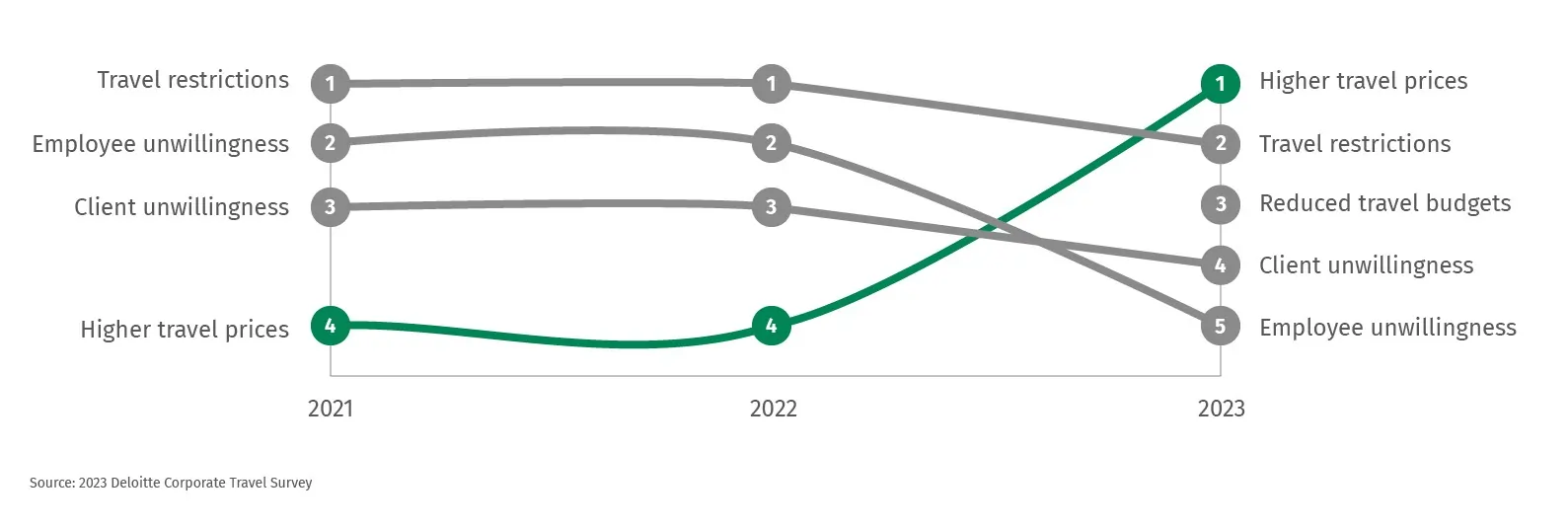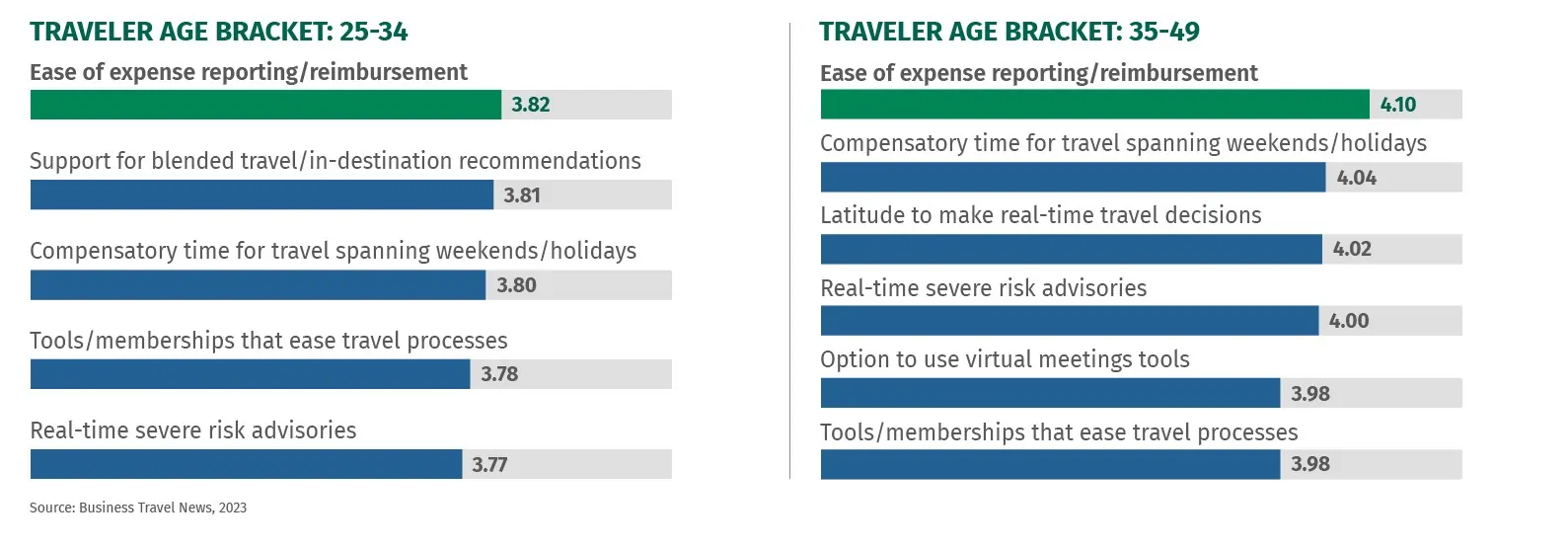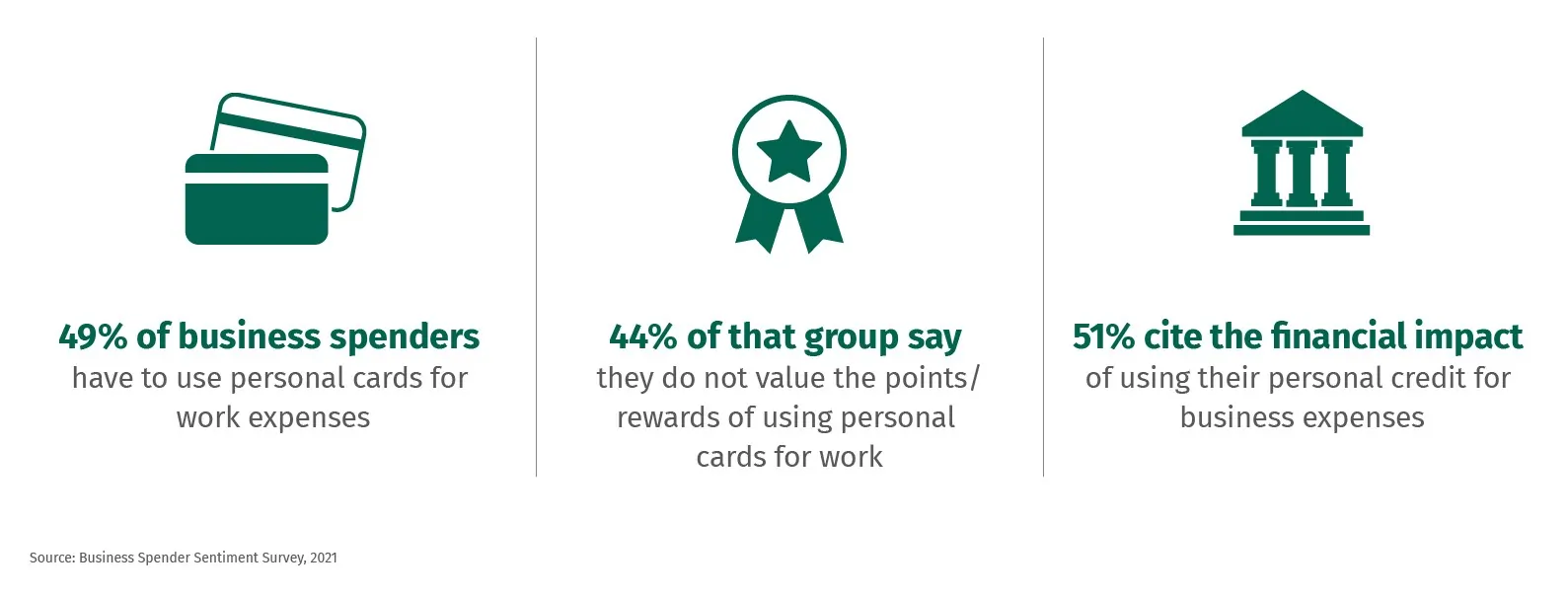
By Rodrigo Sanchez, Head of Commercial Cards | Published September 2023
Download a print-friendly version of this article.
Traveling for business is presenting new and renewed challenges for mid-market businesses. Higher travel costs are colliding with reduced travel budgets at some companies. Transaction security is an elevated concern since cyber threats escalated during the pandemic, and expense reimbursement continues to be cumbersome for employees who travel. For middle-market companies whose business requires some element of employee travel, the current environment may warrant fresh thinking.
Business travel in the post-pandemic world
Travel was one of the areas to face a prolonged and direct hit from the pandemic, but leisure travelers were the first to return to normal habits. Business travel has been slower to follow. Several trends are shaping up around business travel attitudes and decisions:
Coping with higher price tags
The higher price of travel is a dominating factor. In the 2023 Corporate Travel Survey from Deloitte, high prices topped the list of reasons why companies were slow to resume travel.
Top Five Factors Slowing Business Travel Return

Higher costs are not necessarily permanent. While airfares rose amid higher fuel prices and labor shortages, those trends have retreated to some degree. Car rental prices have also come back to earth after surging higher early in the pandemic. Still, there is demand support for continued strength in prices, as leisure travel rebounded past pre-pandemic levels in early 2022. Ultimately, steeper costs for travel could be a longstanding trend.
Taking a more strategic view of corporate travel
Another component of the new normal is the strategic choice underpinning business travel. For many companies, the balance between remote and in-person work is still evolving – and business travel is also seeking a new equilibrium. Companies are looking at travel with fresh eyes – and more options. Clients and companies alike are opting for virtual meetings and conferences in place of in-person events. Yet there is also a heightened sense for the value of in-person collaboration.
Companies Treating Travel with Strategic Importance

More than half of companies are applying more strategy to business travel. According to Deloitte, 66% of companies said they were identifying and prioritizing trips that generate more significant outcomes.
Sustainability considerations also figure into this post-pandemic assessment. Deloitte also reported that most U.S. companies say they expect to reduce travel spend per-employee by 10% to 30% to meet corporate sustainability targets.
Still struggling with expense reimbursement
The post-pandemic world is also characterized by a new digital backdrop – one with higher rates of cyberattacks and fraud, but also a wave of new digitization to make company processes easier. In the Citizens 2023 Payment Trends research, treasury teams at middle-market companies reported that they are generally seeing strong benefits from digitization trends, including improved cash-management efficiency, refined cash-flow forecasting, enhanced visibility and control and a boost to their bottom line.
But for business travelers, digital tools haven’t yet solved certain challenges. Travel expense reporting and reimbursement remains a top concern for corporate travelers. According to Business Travel News, the ease of expense reporting and reimbursement is the top concern among business travelers in the 25 to 34 and 35 to 49 age brackets.
Expense Reconciliation is Still a Thorn in the Side of Business Travelers

Business travel cards offer a mix of tools for today's travel challenges
As the rebound matures, middle-market companies have to establish their new travel norms. Here are three tools available through corporate card programs that can help companies stay on track with post-pandemic goals for cost controls, security and convenience.
1. Set individual, department, and even transaction-level limits to control costs and set strategic guardrails
One of the rare upsides from the pandemic was the widespread cost savings from reduced travel. Many public companies discussed the impact on their bottom line in earnings calls during the early months of 2020.
Unsurprisingly, many companies aim to preserve some of their cost savings as they reestablish norms for business travel. As businesses target new spending levels, corporate-card transaction and spending limits are tools that can help control expenses. Only 41% of companies used corporate-card transaction limits before the pandemic, according to the Global Business Travel Association.
-
Only 41% of companies used corporate-card transaction limits before the pandemic.
Companies may not realize how multidimensional the card-limit tools actually are. Credit limits can be set for individual corporate cards or by department. Cards also allow for settings that restrict transaction time periods, as well as settings that create one-time, daily, or weekly transaction limits.
Virtual cards are an increasingly popular option. A virtual card credit card number is not connected to a physical, permanent credit card; it is generated electronically according to desired parameters. Virtual cards can even be created to pay for one-time transactions, restricted to a specific vendor and specific dollar amount, if desired. For example, a virtual card can be generated to complete a single airfare booking transaction, allowing for tight cost controls.
These tools can also prompt the strategic discussion that companies are now undertaking around travel decisions. Limits can serve as a structure to help teams and departments assess the comparative value of each travel choice.
2. Set company protocols to use all the security features of corporate cards
Pre-pandemic, many businesses failed to make full use of security features for corporate cards. The return to business travel offers an opportune time to review and update company practices. Improved security can cut down on the financial and administrative steps of resolving fraudulent activity.
Percent of Security Features Often or Always Used
Individual card settings are another tool to protect against fraud. Companies can set restrictions on merchant types, country or location of payments, and time periods. These restrictions act as additional roadblocks for unauthorized transactions to corporate cards.
Virtual cards are also effective at cutting down on fraud. According to 2019 data from the Global Business Travel Association (GBTA), 79% of companies said virtual cards are effective against fraud. In 2022, the GBTA Foundation reported that while only 20% of U.S. businesses paid for travel using these single-use virtual accounts, 53% of travel suppliers accepted the payment method.
3. Replace legacy expense-reimbursement with corporate cards to cut down on administration
Compared to older expense-reimbursement systems, corporate cards can be more convenient for both employers and employees. Though reimbursement tools have improved, the approval and reconciliation process is still a tedious administrative process for companies. The system also leaves employers dealing with expenses after the fact, offering little control over merchant types, policy-violating transactions or spending mistakes.
Expense reimbursement can be a pain point for employees, too. About 49% of business spenders (those who make purchases or travel on behalf of their company) did not have corporate credit cards, according to the 2021 Business Spender Sentiment Survey conducted by expense-management firm Center.
Employees Note Expense Reimburse Challenges
In some sectors, employees continue to prefer using personal credit cards so they can collect points, rewards or cash back. But there is a significant number of employees who are stuck in the expense-reimbursement process involuntarily. In that group, only 56% say they value the points or rewards they get from covering business expenses. What’s more, 51% say there are burdens that accompany the personal-card policy. Tying up personal credit with business expenses has a financial impact, including inconvenience and embarrassment when they don’t have sufficient personal credit available. They also report a sense of unfairness at being forced to use personal credit for business expenses.
Remaining flexible on the road ahead
Companies are sure to contend with more changes to business travel in the year ahead. Still, travel is clearly trending upwards toward a new equilibrium. This transitioning window could be an opportunity for companies to take a more comprehensive look at their process for assessing the strategic value in travel, as well as the business-travel tools and protocols available to support their priorities. With upgrades to their process, middle-market businesses could see improvements in cost controls, security and convenience for their business travel going forward.
Actions to consider:
Amid higher travel costs, tightening budgets, and shifting priorities, management teams can revisit company travel policies to make adjustments that meet employees’ and executives’ needs and preferences.
1. Set different types of limits on corporate cards. Settings like transaction amount, merchant type, daily or weekly limits, and even country of payment can help managers implement travel policies and cap spending levels.
2. Explore opportunities to use virtual cards. With elevated security and flexible parameters, virtual cards can offer unique benefits for fraud protection and cost controls.
3. Replace remaining expense-reimbursement programs with corporate cards. Sourcing travel expenses through corporate cards can cut back on administrative commitments, and it could be more convenient for many employees as well.
Rodrigo Sanchez is Head of Commercial Cards at Citizens with over 15 years of experience helping companies optimize payments.
Related Reading
Payments trends in 2023
Explore how 205 middle-market treasury executives view the latest payment-processing tools and the future of payment options.
Optimizing working capital with new payment tools
Get strategic about working capital and payments with new payment tools to extend payables terms, capture early-payment discounts, and trim administrative costs.
Mitigate fraud with virtual cards
Successful capital planning starts with setting your business strategy and pursuing the right financing to drive those objectives.
Ready to take the next step? Get in touch with our team.
All fields are required unless marked as "Optional".
© Citizens Financial Group, Inc. All rights reserved. Citizens Bank, N.A. Member FDIC
“Citizens” is the marketing name for the business of Citizens Financial Group, Inc. (“CFG”) and its subsidiaries. “Citizens Capital Markets & Advisory” is the marketing name for the investment banking, research, sales, and trading activities of our institutional broker-dealer, Citizens JMP Securities, LLC (“CJMPS”), Member FINRA and SIPC (See FINRA BrokerCheck and SIPC.org). Securities products and services are offered to institutional clients through CJMPS. (CJMPS disclosures and CJMP Form CRS). Banking products and services are offered through Citizens Bank, N.A., Member FDIC. Citizens Valuation Services is a business division of Willamette Management Associates, Inc. (a wholly owned subsidiary of CFG).
Securities and investment products are subject to risk, including principal amount invested and are: NOT FDIC INSURED · NOT BANK GUARANTEED · MAY LOSE VALUE
